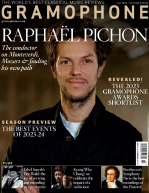Texte paru dans: / Appeared in: |
|
|
Outil de traduction |
|
|
Known primarily as a collaborative musician, Japanese-born London-based harpsichordist and pianist Asako Ogawa has recently been stepping up to the soloist’s plate. The seriousness and deliberation characterising her earlier Bach Goldberg Variations and Partitas releases now gives way to a more confident and creative interpretative presence throughout Handel’s Eight Great Suites.
You hear this in the A major First Suite’s improvisatory opening Prelude, where the runs, pauses and cadence points are apportioned and timed as if Ogawa were truly inventing the music on the spot. While some listeners might consider her going back and forth between even and notes inégales in the Allemande indecisive, I find that the push/pull rhythmic effect adds welcome tension. By contrast, the Gigue flies by at a merrily dancing clip. Ogawa grippingly sings out the Prelude of the Sixth Suite in F sharp minor by way of her masterly finger legato. Nor does she rush through the following Allegro movement, where her left-hand détaché lines generate an undulating momentum. For similar reasons the E major Fifth Suite’s ‘Harmonious Blacksmith’ variations sound faster than they actually transpire; notice, too, the subtle registration shifts.
The ebb and flow resulting from Ogawa’s impressive cantabile control in the E minor Fourth Suite’s Allemande arguably surpasses even such luminaries as Blandine Verlet and Colin Tilney, while few harpsichordists match Ogawa’s shapely lilt in the F major Second Suite’s fugal Allegro. I would have expected her to let go more in the Ouverture of Suite No 7 in G minor and to really play up the music’s brashness and pomp, as Francesco Corti does with almost aggressive abandon (Arcana, 5/22). But Ogawa’s reading of the G major Chaconne stands out for its colourful variety in registrations and organically unified tempo relationships.
The clarity and transparency of her playing also has much to do with her choice of instrument, a 1973 harpsichord built by Klaus Ahrend and modelled after Johann Daniel Dülken. Perhaps Corti’s intensity and adventurous embellishments are best absorbed in small doses, while one can take Ogawa’s thoughtful virtuosity in longer stretches. In all, her Handel Suites count among the best recorded versions. |
|




